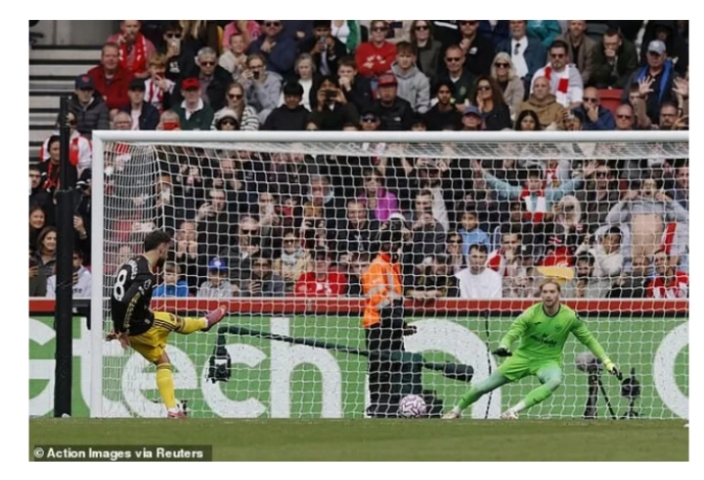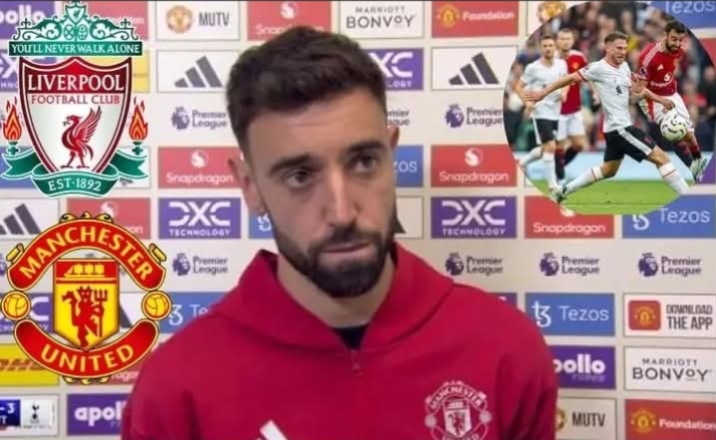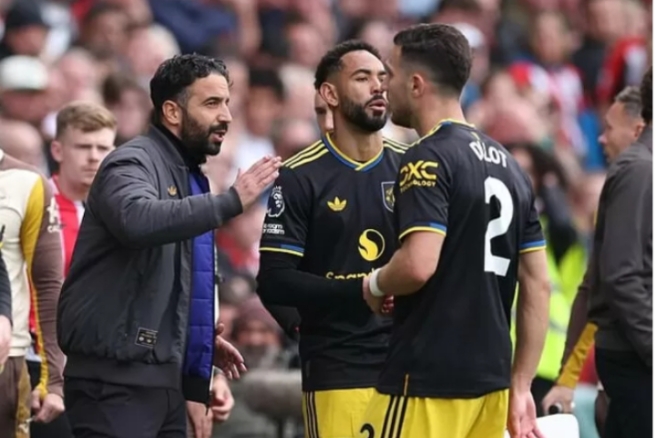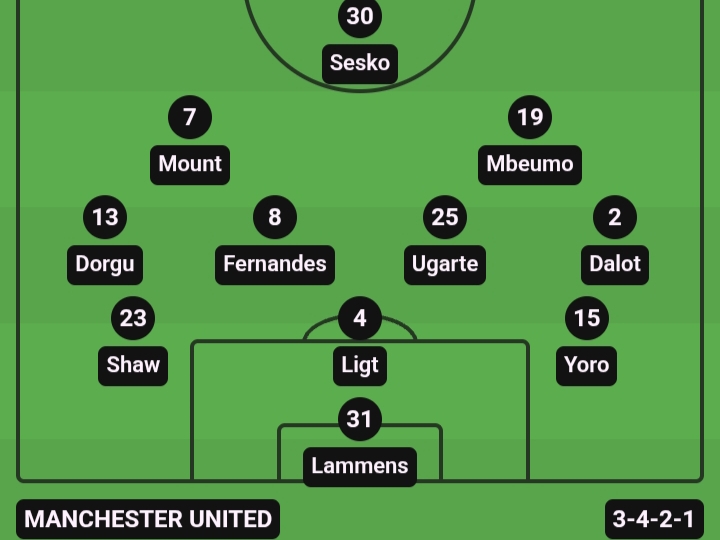Ruben Amorim makes Bruno Fernandes penalty decision ahead of Liverpool clash
—
Background & context
Bruno Fernandes has long been Manchester United’s principal penalty taker, having established a very strong record over several seasons. Recent form, however, has brought his role under increased scrutiny.
Amorim is preparing United for their trip to face Liverpool FC, a fixture with historic weight, and one where fine margins—including penalties—can decide outcomes. It is in this high-pressure context that the manager’s decision on the spot-kick hierarchy becomes significant.
According to reports:
Fernandes has missed two of the three spot-kicks he has taken this season in the Premier League (against Fulham and Brentford).
Despite those misses, Amorim has publicly reaffirmed that Fernandes remains first choice from the penalty spot. “Yes, he’s the main taker,” the manager stated.
Amorim added a bit of colour: “I think he has 70 penalties, he misses like nine – two with me. So I’m really annoyed with that!”
He stressed that Fernandes is “really confident”, that he is practising and understands that people are watching how he takes his penalties.
—
Why the decision matters
1. Psychological confidence & leadership
By sticking with Fernandes, Amorim shows faith in his captain and senior figure. That decision has psychological importance: it signals trust, which can help the player’s confidence and, by extension, the squad’s belief. In a high‐stakes match at Anfield where mental edge matters, reaffirming a leader can help stabilise things.
2. Penalty taker hierarchy and consistency
Changing the penalty taker mid‐season or ahead of a big game could introduce uncertainty. Amorim’s decision to maintain continuity avoids that disruption. He also leaves the door open—“we have other options if we need”—so the hierarchy is clear but not rigid.
3. Addressing recent form vs long-term record
Fernandes’s recent misses raise legitimate questions. But his historical record remains excellent. By emphasising his overall numbers (70 attempts, about nine missed) and trusting his training and mindset, Amorim balances short‐term concerns with long‐term trust. This reflects a managerial approach of backing his key players even when things are rough.
4. Implications for the match dynamics
Against Liverpool, chances may be limited and spot-kicks possibly rare but decisive. Having the best taker, someone comfortable under pressure, is crucial. Amorim’s decision suggests he believes Fernandes still fills that role better than alternatives, even with recent blips.
—
What the decision reveals about Amorim’s approach
Accountability and ownership: The quote “two with me … I’m really annoyed with that” shows Amorim accepting some responsibility. He is publicly acknowledging the misses and signalling that the player and manager are aware of the issue. That transparency can foster trust.
Preparation & training focus: Amorim notes Fernandes is practising penalties, paying attention to how he is observed (“people are watching the way he scores the penalties”). This suggests that Amorim views penalties not just as a spontaneous moment but as rehearsed, prepared situations.
Balancing faith with realism: While reaffirming Fernandes, he still mentions “we have more guys … if he needs”. That gives flexibility and keeps others ready. He is saying: yes Bruno is first choice, but we won’t be caught off guard.
Managing the nerves: There’s a sense Amorim is keen to manage both the player’s nerves and the team’s expectations. By backing him publicly, Amorim may alleviate internal second‐guessing and external speculation, allowing Fernandes to focus on execution rather than debate.
—
Wider implications for Manchester United
Team morale: By backing the penalty taker, Amorim sends a message to the squad: we trust our leaders. That can build unity. If he had changed the taker, that could have sowed doubt or division around leadership roles.
Tactical confidence: Knowing you have a reliable penalty taker (or at least one you trust) can affect how a team attacks in the box. United may feel they have a better chance of converting tight situations, which can influence how they press, how they draw fouls, how they manage attacking transitions.
Pressure management: At Anfield, the pressure will be intense. Big decisions, such as giving away a penalty or having to take one, will magnify. Amorim’s clear stance helps avoid ambiguity: if a penalty arises, everyone knows it is Fernandes unless extreme circumstances. That can reduce hesitation and internal argument.
Possible cost of errors: Keeping faith has benefits, but if Fernandes misses again (especially in a crucial moment), the cost could be high in terms of results and perception. The decision carries risk. But Amorim appears comfortable with that risk.
—
Potential alternatives and why they were not chosen
Some have suggested United might shift to another taker given Fernandes’s recent misses. The reports emphasise that while there are other options, Amorim opted to stay with the incumbent. The reasoning may include:
Fernandes’s excellent historical conversion rate.
His experience and mental strength in big games.
The desire to avoid sending a message of panic or lack of faith.
The idea that penalty preparation is ongoing, so the short‐term miss streak isn’t enough to replace him yet.
—
What to watch on Sunday / key moments
Will United win a penalty? If yes, it will be interesting to see how Fernandes handles the moment, especially given the context of his recent misses and the loud Anfield crowd.
Fernandes’s body language: Is he confident? Does he look calm and composed on the spot? How does his run-up compare to previous attempts? These subtle cues can reveal whether the public backing has translated into internal assurance.
If an alternate taker is used: Amorim said “if we need, we can change”. If for any reason Fernandes doesn’t take it (injury, substitution, fixture context) that would signal a shift and be noteworthy in itself.
The build-up to the penalty: How United attack in transition or set-pieces might aim to draw fouls. Knowing they have faith in their taker might influence their decision‐making in the box.
After the penalty miss / goal: The response matters. If Fernandes scores, the decision will look vindicated. If he misses, how the team and manager respond (substitution, comments, body language) will tell how robust this decision is.
—
Challenges & caveats
Small sample size vs high expectations: While Fernandes’s overall record is strong, the recent misses come at a bad time. The Anfield match is high pressure, and one failure may magnify.
Team dynamics: If other players believe they could do better from the spot, there’s potential tension. Amorim’s comment about “we have more guys” leaves room but also invites contender names.
Confidence vulnerability: A penalty miss can impact not just the taker but the team’s momentum. United must ensure their structure and focus aren’t shaken if such a moment arises.
Opponent awareness: Liverpool’s players and fans will know that United back Fernandes and may seek to force situations (get fouled, commit to penalties, psychological warfare) knowing the taker’s recent record. United need to be alert to the opponent’s tactical gambits.
—
Conclusion
Rúben Amorim’s decision to retain Bruno Fernandes as Manchester United’s first-choice penalty taker ahead of the Liverpool clash reveals several things: a belief in continuity and leadership, a respect for historical performance over immediate dips, and a tactical and psychological approach that prizes clarity and preparation over reaction.
It is a gamble (as all managerial decisions are) but one grounded in confidence. The backdrop of an Anfield visit, with its intensity and potential for defining moments, makes that clarity even more important. By publicly backing Fernandes, Amorim is saying: “We believe in you. You will take responsibility. The team will stand behind that.”
For United, that may instil calm and focus in what could otherwise become a distracted environment. For Fernandes, it’s a big vote of confidence—but also a reminder that standards remain high. If he delivers, the decision will look astute; if not, it could be seen as part of a turning point in United’s season.
Whether it pays off or not will be seen in Sunday’s action. But the decision alone tells us much about Amorim’s management style: trust, clarity, preparedness and willingness to stand by his leaders. And for United heading into a cauldron like Anfield, that kind of leadership may well be as important as the tactics on the pitch.













Leave a Reply